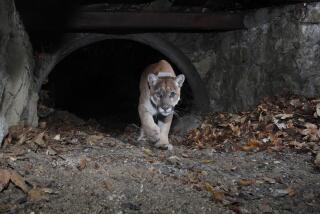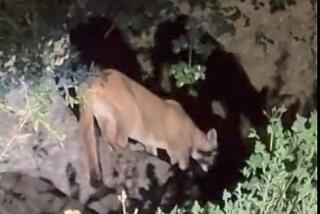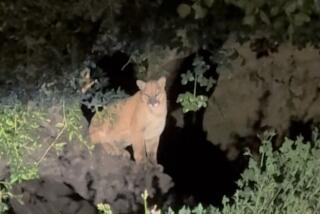The Heart of the Matter
Long into this inquiry about the lions of Kenya’s Tsavo National Park, Philip Caputo concedes: “ ... my heart hasn’t been into it.” Readers will have beaten him to the conclusion.
“Ghosts of Tsavo” reads like a collection of note cards for a vacation slide show, prepared by a man who left behind most of his slides, but never mind, because well, the trip was pretty OK, except when I had a bad reaction to my medicine, but anyway, we took some walks, and the lions mostly slept, except for sometimes, and I met all kinds of people ....
Caputo is a far better writer than he demonstrates here. When he puts his heart into it--chiefly on matters of war--he has something to say and the driving voice to say it. In fiction and in memoir, he is also a man infected with “go-fever,” as he once put it, for the crackle of atmospheric places and adrenaline of danger. Perhaps the oversized and mythicized lions of eastern Kenya’s thorn brush just weren’t enough.
Surely it was not enough to narrow the topic, as he does, into a inconclusive investigation into the possible reasons why the male lions of Tsavo have scruffy or nonexistent manes. That may make a satisfactory installment for National Geographic magazine, but it runs dry quickly when padded by miscellany into a book.
Caputo was drawn by “The Man-Eaters of Tsavo,” the story, now legend, of two giant lions who killed 135 laborers and terrorized hundreds more during the construction of the first rail line into British East Africa in 1898. That classic travel-adventure journal was of an age when the British were still trying to get their arms around their exotic empire, when Africa’s lions did not snooze away their afternoons surrounded by circles of tourist-laden minivans.
“Ghosts of Tsavo” assumes that the contemporary rampage of a lion far removed in Zambia is enough reason to revisit this mother of all lion stories back in Kenya in the company of sundry scientists and photo-safari guides. After all, Caputo asserts in his opening paragraph, to Americans “a predator that devoured humans was a threat even more remote than famine or plague, pretty much on the same level of possibility as an invasion of extraterrestrials.”
Perhaps the writer was busy and missed last summer’s headlines about shark attacks in Florida. Or the tragedy of the occasional mountain lion to haunt a California suburb. Or the periodic grizzly bear maulings in Alaska and Montana.
With this book, the die-hard Caputo fan will find it a long slog between watering holes for the chance to see him take on the panorama and drama of Africa. The rest of us have little reason to bother this time.
More to Read
Sign up for The Wild
We’ll help you find the best places to hike, bike and run, as well as the perfect silent spots for meditation and yoga.
You may occasionally receive promotional content from the Los Angeles Times.






